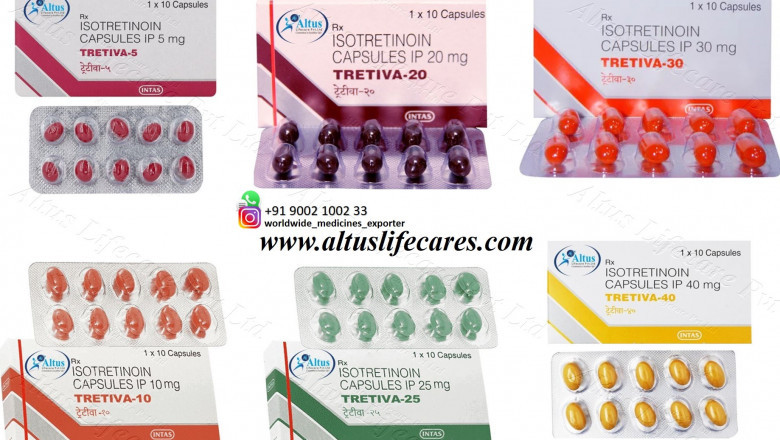views
Isotretinoin Capsules: A Definitive Solution for Severe Acne
Introduction: A Skin-Saving Breakthrough in Dermatology
In the realm of dermatology, few treatments have revolutionized acne management like Isotretinoin Capsules. Originally developed as a potent retinoid, Isotretinoin is now hailed as a gold-standard therapy for individuals battling severe, nodulocystic, or treatment-resistant acne. This oral medication is a derivative of vitamin A and works by targeting all four root causes of acne—excess oil production, clogged pores, inflammation, and bacterial growth. With just one treatment course, many patients experience life-changing skin clarity and restored self-confidence.
The power of Isotretinoin lies not only in its unmatched efficacy but also in its long-lasting results. Dermatologists worldwide recommend it when topical therapies and antibiotics fail, often considering it a miracle drug for those plagued by persistent breakouts. In this detailed review, we explore the science, benefits, usage, and long-term outcomes of Isotretinoin Capsules. Whether you're a healthcare professional or someone considering this treatment, this comprehensive guide aims to provide everything you need to know—through a positive lens focused on transformation and empowerment.
Table of Contents
- What Are Isotretinoin Capsules?
- History and Development of Isotretinoin
- Mechanism of Action: How It Transforms the Skin
- Indications and Ideal Candidates for Isotretinoin
- Dosage Guidelines and Administration Tips
- Clinical Efficacy and Expected Results
- Side Effects: What to Expect and How to Manage
- Safety Precautions and Monitoring
- Comparison with Other Acne Therapies
- Psychological Impact: Confidence Beyond the Skin
- Real-Life Success Stories and Patient Testimonials
- Dermatologists’ Perspective: Why Experts Trust Isotretinoin
- Myths and Misconceptions Debunked
- The Future of Retinoid-Based Acne Therapy
- Final Reflection: A New Beginning for Your Skin
- Frequently Asked Questions (FAQ)
1. What Are Isotretinoin Capsules?
Isotretinoin Capsules are a form of systemic retinoid therapy used to treat severe and recalcitrant acne. The active ingredient, isotretinoin, is a synthetic analog of vitamin A that dramatically reduces sebaceous gland activity and normalizes skin cell turnover.
These capsules are typically prescribed under brand names such as Accutane, Roaccutane, Sotret, Claravis, and Absorica, among others. Available in multiple strengths (usually 10 mg, 20 mg, and 40 mg), they are taken orally, typically once or twice daily depending on the prescribed regimen.
Because of their potent activity, Isotretinoin Capsules are often reserved for moderate to severe acne, especially when previous treatments—such as antibiotics and topical agents—fail to deliver satisfactory results.
2. History and Development of Isotretinoin
Isotretinoin's journey from concept to clinical marvel is nothing short of remarkable. It was first introduced in the 1980s by Roche under the brand name Accutane, revolutionizing acne treatment with its ability to achieve near-total remission in severe cases.
Initially, it was used cautiously due to its powerful nature, but over time, with refined protocols and extensive research, its safety and efficacy became well-established. Since then, generic versions and alternative brands have entered the market, making this once-premium treatment more accessible to patients globally.
Its development represents a turning point in dermatology—providing a solution that not only treats acne at its root but also significantly improves quality of life.
3. Mechanism of Action: How It Transforms the Skin
Isotretinoin works on multiple levels, offering a comprehensive approach that no other acne medication can match:
- Reduces Sebum Production: It drastically shrinks the sebaceous glands, cutting oil production by up to 90%, which starves acne-causing bacteria and prevents pore blockages.
- Unclogs Pores: By normalizing keratinization, Isotretinoin prevents the buildup of dead skin cells within pores.
- Anti-Inflammatory Effects: It significantly reduces inflammation, making it especially effective for red, painful, cystic acne.
- Inhibits Bacterial Growth: Without excessive oil, Cutibacterium acnes (formerly Propionibacterium acnes) struggles to survive.
This four-pronged mechanism makes Isotretinoin a true multitasking agent. In short, it resets the skin from within, leading to sustained remission and preventing future flare-ups.
4. Indications and Ideal Candidates for Isotretinoin
Isotretinoin is approved and widely used for the treatment of:
- Nodulocystic Acne
- Severe Inflammatory Acne
- Acne unresponsive to antibiotics or topical retinoids
- Acne with significant scarring
- Psychologically distressing acne
- Recurrent or relapsing acne
It may also be considered in select cases of moderate acne if the patient has failed multiple standard therapies. Isotretinoin is also sometimes used off-label for conditions like:
- Rosacea (severe cases)
- Hidradenitis suppurativa
- Seborrhea
- Oily skin and enlarged pores
Ideal candidates are typically adolescents and adults who are physically healthy, mentally prepared, and capable of adhering to follow-up requirements such as blood tests and pregnancy prevention protocols.






















Comments
0 comment